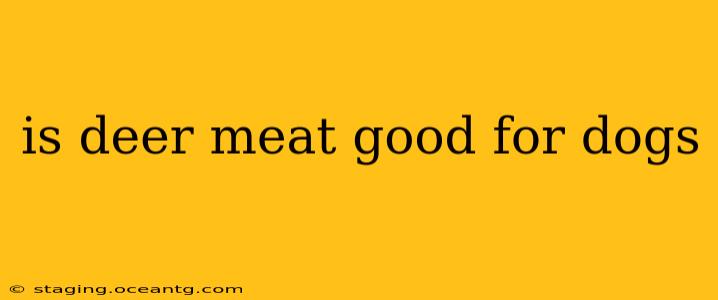Deer meat, or venison, is a lean and nutritious protein source often touted as a healthy alternative to commercially produced dog food. But is it truly good for your canine companion? The answer, as with most things in pet nutrition, is nuanced. While venison can offer several benefits, it's not a universally ideal option and should be incorporated into your dog's diet with careful consideration.
What are the benefits of feeding deer meat to dogs?
Venison is a fantastic source of high-quality protein, essential for building and repairing tissues, supporting a healthy immune system, and maintaining energy levels. It's also relatively low in fat compared to other meats like beef or pork, making it a suitable choice for dogs prone to weight gain or with specific dietary restrictions. Furthermore, venison is naturally lower in cholesterol than many other meats, benefiting dogs with heart conditions or a predisposition towards high cholesterol. The rich iron content contributes to healthy red blood cell production.
Is deer meat safe for dogs to eat?
Generally, yes, deer meat is safe for dogs to eat, provided it's properly prepared and sourced. However, raw deer meat carries the risk of bacterial contamination, including E. coli and Salmonella. Always ensure venison is thoroughly cooked before feeding it to your dog to eliminate these potential hazards. Additionally, be mindful of the source of the venison. Wild game, while nutritious, might contain parasites or other contaminants if not properly handled. Opt for ethically sourced and inspected venison whenever possible.
Can deer meat cause allergies in dogs?
Like any new food introduced into a dog's diet, venison has the potential to cause allergic reactions in sensitive individuals. Symptoms can range from mild skin irritation and itching to more severe gastrointestinal issues. Start by introducing small amounts of cooked venison and carefully monitor your dog for any adverse reactions. If you notice any signs of an allergic response, discontinue use immediately and consult your veterinarian.
What are the potential risks of feeding deer meat to dogs?
While generally safe and nutritious, there are some potential downsides:
- Parasites: Raw or improperly cooked venison can harbor parasites that could infect your dog.
- Allergies: As mentioned earlier, venison allergies are possible.
- Bone fragments: If feeding raw or cooked bones, ensure they are appropriately sized to prevent choking or digestive issues. Avoid giving cooked bones, which can splinter.
- Nutrient deficiencies: Venison alone doesn't provide a complete and balanced diet. It should be part of a broader, well-rounded nutritional plan.
How should I feed deer meat to my dog?
Never feed raw deer meat to your dog. Cook it thoroughly to kill any potential bacteria or parasites. You can incorporate small amounts of cooked venison into your dog's regular food, or you can use it as a treat. Always supervise your dog while feeding them venison to ensure they are eating safely and not choking on any bone fragments. Moderation is key; don't replace your dog's complete and balanced diet solely with venison.
What are the alternatives to deer meat for dogs?
Many other protein sources are excellent for dogs, including chicken, turkey, lamb, and fish. Always consult your veterinarian before making significant changes to your dog's diet. They can help you determine the best protein sources based on your dog's individual needs and health status.
Is venison better than other meats for dogs?
Venison is a lean and nutritious option, but it isn't necessarily "better" than other meats. The best protein source for your dog depends on several factors, including breed, age, activity level, and any existing health conditions. Variety in a dog's diet is crucial, so offering a range of protein sources is generally beneficial.
In conclusion, venison can be a healthy addition to a dog's diet when prepared and sourced correctly. However, it's vital to introduce it gradually, monitor for allergic reactions, and ensure it's part of a balanced nutritional plan under the guidance of a veterinarian. This approach ensures your canine companion benefits from the nutritional value of venison while minimizing potential risks.
